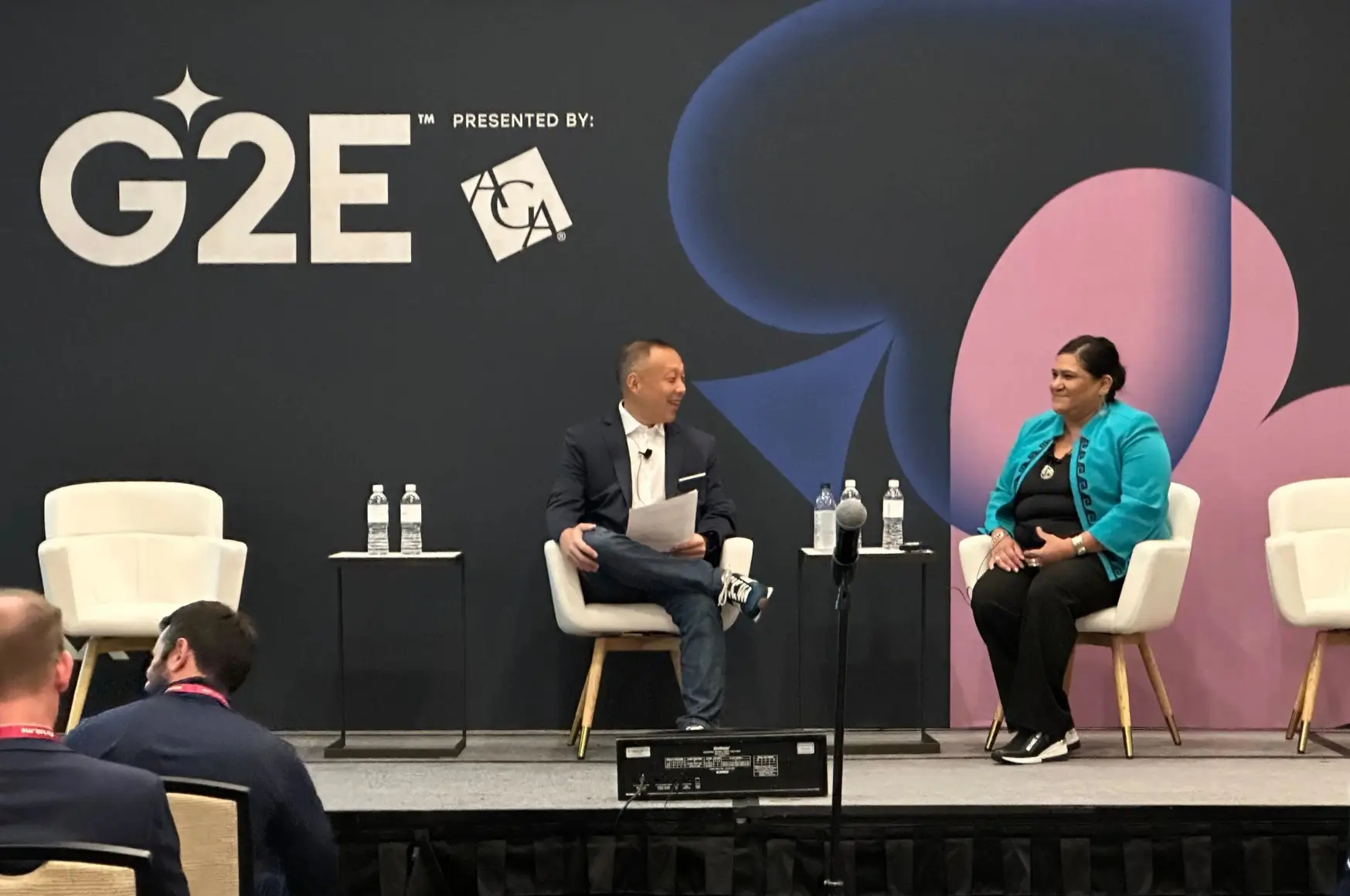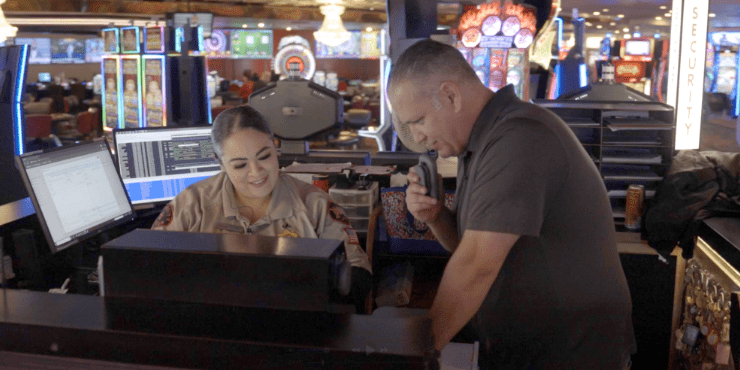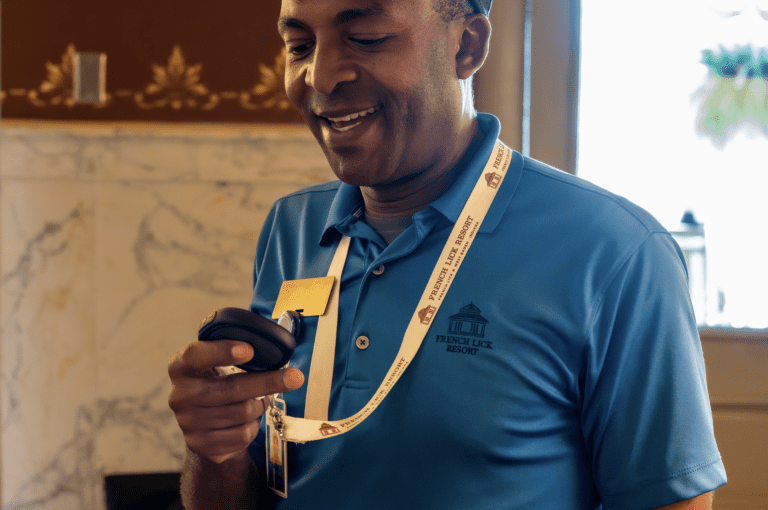Casino floors are intricate ecosystems where guest experience, security, and operational efficiency must converge perfectly. For technology leaders in this high-stakes environment, the path to innovation often requires more than just technical expertise—it demands a deep understanding of the people working on the floor.
At G2E in Las Vegas this year, Robin Villareal, the first Native American female Chief Information Officer (CIO) for Gila River Resorts and Casinos, delivered her session, “From the Floor to the C-Suite: A CIO’s Perspective on Technology That Truly Empowers.”
Interviewed by Relay CEO and co-founder Chris Chuang, Villareal offered a powerful, perspective-shifting look at how her journey from a frontline associate to a C-level executive shapes her current technology strategy, providing a clear roadmap for operators seeking to balance high-tech solutions with high-touch service. Backed by a career supporting the opening of seven casinos and three major hotel resort expansions since 1995, her insights are grounded in unparalleled operational scale, which she deliberately uses to reinforce the frontline foundation of every decision.
The View from the Floor: Strategy Built from the Ground Up
Robin Villareal’s career trajectory is anything but traditional. Starting 30 years ago as a beverage server, when a promised buffet hostess role didn’t yet exist, she learned the rhythm of the casino floor firsthand. This frontline foundation is the bedrock of her C-level strategy today.
Villareal notes that a common misconception among floor staff is that the C-suite spends money blindly or doesn’t care about their daily struggles. Her mission has been to dismantle this myth by ensuring every technology decision is informed by the user. She stresses that a successful technology rollout isn’t complete after implementation; it’s done when the frontline confirms it works. This means prioritizing immersion and direct feedback.
When rolling out their new AI-enabled communication solution, she personally stopped housekeepers and slot techs on the floor to ask, “How do you like that cool radio?” Through these direct conversations, she confirmed the system’s immediate value: features like language translation instantly improved communication between co-workers who spoke Spanish, English, or Cambodian, eliminating a daily operational barrier. This boots-on-the-ground approach ensures that the frontline’s needs are met and emphasizes that IT must communicate the “why” behind any investment to gain crucial buy-in.
Empowerment: The Core of Gila River’s Culture
For Villareal, technology is only as strong as the people wielding it. This belief is rooted in her Native American heritage, specifically the Hopi teachings “Numi’nangwa,” which translates to “coming together and taking care of each other” and “Sumi’nangwa,” which translates to “coming together to collaborate.” She fosters a culture of trust and collaboration that has resulted in an impressive 98% retention rate on her team, a rarity in the modern tech landscape. In fact, Villareal proudly notes that she has team members with a tenure of over 17 years, demonstrating the long-term commitment that her people-first philosophy inspires.
Her retention strategy begins with recruitment and training. Villareal often brings people in from guest service and front-of-house roles, prioritizing their service skills and customer-facing foundation. She then backs them with an aggressive 90-day training program, allowing new hires a full year to grow into the technical role. As she notes, her goal is to move beyond the traditional “IT hero/villain” dynamic, where the department only hears from others when things go wrong. Her simple, yet effective, tactic for making IT feel recognized and valued? “Stop and bring them food.” This small gesture ensures her team is seen, appreciated, and integrated.
Future-Proofing Safety with AI and Data
When the conversation turned to managing chaotic security incidents, the discussion centered on the reality that such events are fundamentally data problems requiring a clear signal, not noise, for fast response. Villareal champions this insight, framing her partnership expectations around tools that provide this clarity.
Villareal’s operational philosophy demands that technology must constantly innovate to eliminate friction and enhance efficiency. This is reflected in her demand for vendor innovation to solve problems, such as a 90-minute manual process required for setting up a single user, which prevents her team from performing more high-value work.
This commitment to innovation is a core criterion in her technology partnerships. When Chris Chuang introduced the potential for AI Channel Scanning, an innovation designed to manage simultaneous communications and separate the signal from the noise, Villareal immediately recognized its strategic importance. For a high-stakes environment where security teams must process real-time data to make rapid decisions, the continuous evolution of tools using AI is a necessity for maintaining operational integrity and protecting the brand.
Leveraging Efficiency for the Human Touch
In the complex casino environment, technology’s highest purpose is to enable the human touch, not replace it. Every investment must contribute to greater efficiency, which frees up staff to deliver superior service.
Villareal envisions a future of “smart hospitality,” where AI and data can help move toward a virtual concierge that extends the feeling of being a “high roller VIP” to every single guest. Technology handles the mundane, automating administrative tasks like user setup (which can take an hour and a half manually), so that floor staff have the mental bandwidth to focus on core guest service.
This drive for efficiency and perfect execution extends to the guest experience in subtle but important ways. Villareal views cybersecurity as a matter of brand integrity. She champions due diligence in all technology purchases, recognizing that security is a data problem best tackled by ensuring security teams have the right tools and training. Her on-the-floor immersion even extends to the perceived quality of the facility: when she sat next to a guest in the sportsbook and heard a complaint about screen pixelation, it drove home how even small audio-visual flaws can impact the overall guest experience.
Leadership Advice: Challenge and Confidence
Villareal’s journey is a lesson in confidence. She advises leaders to overcome the fear and self-doubt that often accompany high-level roles: “Don’t be scared.” The imposter syndrome fades when you realize you have earned your seat at the table.
Her final advice for current and emerging leaders is straightforward and powerful:
“If you get an opportunity to be at the table, take that opportunity. If you’re not going to say anything while you’re at that table, get up and leave so someone else can have an opportunity.”
Villareal actively encourages her smart, experienced team to challenge her, knowing that a leader is not always right. For the casino industry, this willingness to listen, empower, and challenge the status quo is the foundation of the lasting success and proud culture being built at Gila River Resorts and Casinos.




